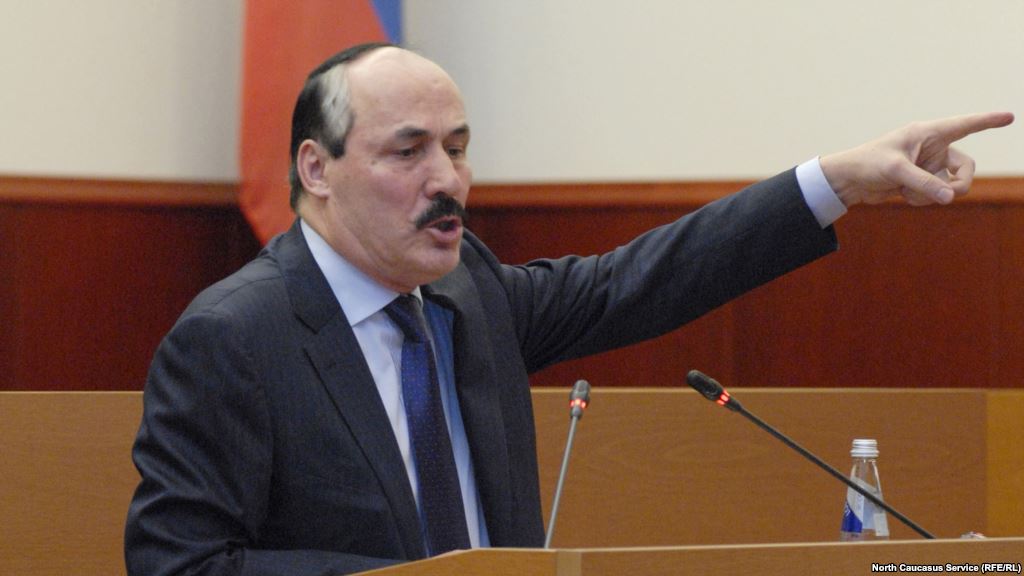
Head of Dagestan Faces Criticism From Moscow
Publication: Eurasia Daily Monitor Volume: 11 Issue: 161
By:

September 8 marked a year since Ramazan Abdulatipov became governor of Dagestan. Abdulatipov was officially appointed governor of the region in September 2013, even though he had been the acting interim head of the republic since January 2013. Despite Moscow’s approval of Abdulatipov and the sweeping changes he heralded with his anti-corruption and modernization campaigns, the political situation in the republic has remained extremely unstable, and various actors have challenged the governor’s authority. This is especially puzzling given that Abdulatipov managed to unseat Said Amirov as mayor of the republican capital Makhachkala, who was arguably Dagestan’s most powerful political leader at the time.
In July, Moscow’s envoy to the North Caucasus, Sergei Melikov, and the chief of the Russian Ministry of Interior’s Main Directorate in the North Caucasian Federal District, Sergei Chenchik, unexpectedly lashed out at the Dagestani government. Melikov and Chenchik participated in a public forum on security issues in the North Caucasus. They attacked the republican government for not having a youth policy department, said its anti-terrorism was dysfunctional and hinted that it had been involved in embezzling governmental funds. This attack on Abdulatipov’s government was certainly not simply the personal opinion of Melikov and Chenchik, but a signal from the very top circles in Moscow, local observers said (chernovik.net, September 5).
Sergei Melikov is a lieutenant general in the interior ministry who oversaw counter-terrorist operations in the North Caucasus until his appointment as Moscow’s civilian envoy to the region in May 2014. Sergei Chenchik is also an important and long-time counter-terrorism official in the North Caucasus. These high-profile figures certainly had serious backing when they criticized Dagestan’s government. However, many observers were astounded when a mere head of a municipal district rejected the republican government’s demands to step down. Kurban Kurbanov, the head of Derbent district, which is located in southern Dagestan on the border with Azerbaijan, said in August that he would not step down from his position after Abdulatipov announced his resignation. The Kurbanov family’s clan is said to have been in power in the Derbent area for several generations. More importantly, they are ethnic Azerbaijanis, who constitute a majority of the district’s population. Some sources alleged that Kurbanov visited Baku before publicly declaring he would not step down. In addition, municipal authorities in the Russian Federation are not formally part of the central government and cannot be removed by government decrees. However, in practice, the government can usually manipulate the municipal authorities and replace them, if needed. It is interesting to note that the Dagestani authorities avoided accusing Kurbanov of being connected to foreign powers, even though in other circumstances they would have used this as a basis for accusing him of treason. Baku apparently has fairly strong positions in Dagestan and beyond, and the Dagestani authorities appear to be avoiding any potential confrontation with their neighbor (Novoe Delo, August 18).
Abdulatipov’s team responded to the encroachments on his power. On September 10, Dagestan’s parliament hurriedly passed a law in the first reading that abolishes direct elections for the heads of districts in Dagestan. Instead of direct elections, the legislation envisages a system of elections of municipal leaders by municipal deputies. Given Dagestani realities, this will mean that the republican authorities will have a decisive say in who is elected head of a district. When Abdulatipov spoke in parliament on behalf of the measure, he reportedly complained that “people above take away 50 percent of [my] power, people below take away 40 percent of [my] power and I remain without any powers at all.” However, Dagestani experts doubt the new law will allow Abdulatipov to establish the type of control over Dagestan’s municipal authorities he would like. Some say there are strong regional leaders who cannot be replaced simply because Makhachkala wants them to go, while others note that under the present clan system, regardless of what the official procedure is, the clans will continue to rule the republic’s municipalities (Kavkazky Uzel, September 11).
Abdulatipov’s team responded to the Melikov and Chenchik attacks by organizing their own conference on combating extremism, which was held on August 6. Several analysts with connections to the Dagestani government accused the police of human rights violations that breed instability rather than fight the insurgency (chernovik.net, September 5). Such bold public statements are never heard from republican governments in the North Caucasus. In the conflict between Dagestan’s government and Moscow’s representatives in the North Caucasus, the republican authorities suddenly made an audacious move, which points to heightening tensions in the republic.
Moscow may have been expecting to resolve Dagestan’s problems by appointing the “right” person to rule the republic. However, given that there are few signs the situation in the republic is becoming less volatile, and given that its economic woes are unresolved, Moscow may be disappointed with Abdulatipov. For his part, Abdulatipov is evidently dissatisfied with the level of authority he has. While he cannot receive more power from Moscow, he is scrambling for power inside the republic. However, the complexity of Dagestan’s ethnic and geographic make-up stands in the way of building another power vertical in the North Caucasus.




